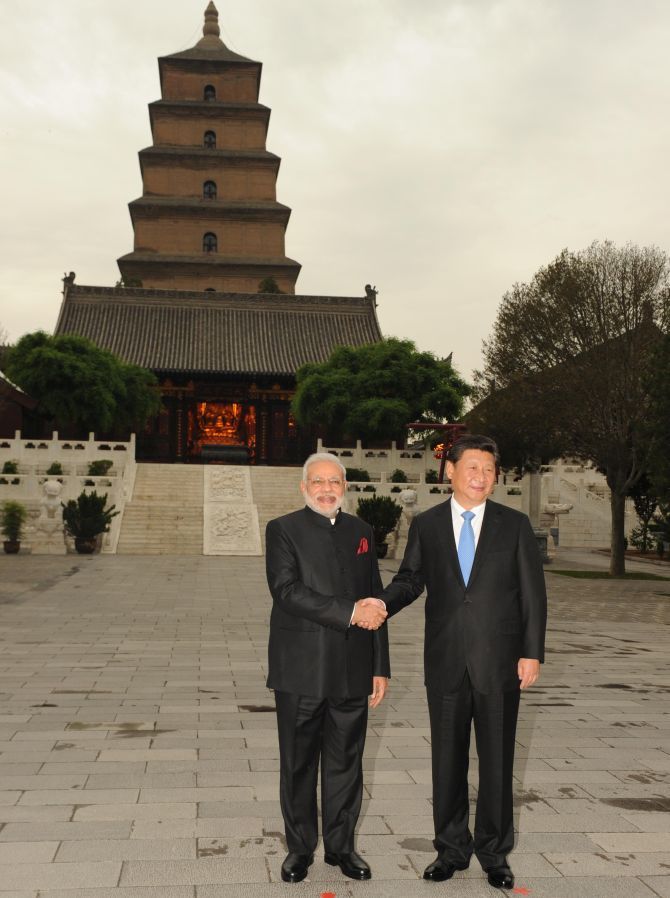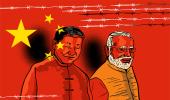'The need of the hour is to build on the positives and control the negatives,' says Colonel (Dr) Anil A Athale (retd).

IMAGE: Prime Minister Narendra D Modi greets Chinese President Xi Jinping at the Wild Goose Pagoda in Xi'an, May 14, 2015.
It was the first time a Chinese leader had welcomed a visiting leader outside Beijing. Photograph: MEAIndia/Flickr
As Prime Minister Narendra D Modi travels to China for the first informal summit with Chinese leader Xi Jinping, there is palpable excitement in India amongst those who have been long advocating making the 21st century as the Asian Century.
In Mr Modi's persona, India has after a long time a leader who thinks big and out of the box.
The summit in Wuhan is taking place amidst the turmoil in the world caused by a dysfunctional United States under a maverick and accidental leader.
The ancient nations of India and China have shown great statesmanship to rescue the world from international anarchy.
Whatever the ambitious agenda of the two leaders, Mr Modi and Mr Xi will have to deal with some bilateral issues before they can offer the world leadership.
The first on the agenda would be the future of Tibet.
As someone deeply impressed by the earthy wisdom of His Holiness the Dalai Lama, I am a natural sympathiser of the Tibetan cause. Yet at the same time, as a realist, one has to understand that 'independent Tibet' is a pipe dream.
Even in the 1950s and 1960s, when China was a weak power, it considered Tibet as part of China. What could not be achieved in the 1960s is virtually impossible to achieve in the 21st century when China is on its way to become a superpower.
To be fair to the Chinese, it is my understanding that the Chinese have in the past offered substantial internal autonomy to the Tibetans in what is called 'Little Tibet' consisting of the present boundaries of the Tibet Autonomous Region.
Unfortunately, the Tibetan government in exile hankers after cultural autonomy not just for present Tibet but 'Greater Tibet' that has parts of neighbouring areas with a Tibetan population.
Partly this is out of sentimental reasons since His Holiness the Dalai Lama himself was born in what is called Greater Tibet.
But by insisting on the maximalist solution the Tibetan government in exile is frittering away an opportunity to solve the Tibetan problem.
Almost ten years ago, I discuss this issue with the 'foreign secretary' of the Tibetan government in exile. My point was and remains so is that it is better to accept less than an optimal solution before it is too late.
In the rigidity of some Tibetan positions, one can see a clear Western hand that wants to keep the issue of Tibet alive.
But time and tide wait for none and it is certain that the support that the Tibetan cause gathers around the Buddhist world will evaporate after the current Dalai Lama is no more.
Much of the popular support to the cause has much to do with the personality and prestige that His Holiness the Dalai Lama enjoys in the Buddhist world.
I have seen it first hand in the Buryat republic of the Russian Federation, a Buddhist majority province of Eastern Siberia. To expect similar adoration and support for the next Dalai Lama, as and when the current one leaves this world, is to hope for the impossible.
If the Tibetans in exile in India accept a compromise solution and return to Tibet, a major irritant in Sino-Indian relations will be removed.
A relaxed China can then let the border areas return to their centuries-old tranquility.
The second issue that can be an obstacle in the Sino-Indian partnership is the vexed border issue.
Last year's Doklam standoff nearly derailed bilateral relations. As a student of the Sino-Indian border issue for over 30 years, I have been advocating a 'gradual' or a graded approach -- contrary to the Indian stand.
The very approach that India favours vis a vis Pakistan is jettisoned when it comes to the Sino-Indian border.
The issue has been further complicated by Chinese aggression in the 1980s when assured of American support, China began to claim the whole of Arunachal Pradesh.
Military logic based on geography dictates that militarily it is beyond the Chinese capability to 'conquer' the Himalayan state.
This move by China to describe Arunachal as Southern Tibet has now come to be a major obstacle in the path of peace.
In the 1960s when Sino-Indian tensions led to war, it was Ladakh and the Aksai Chin plateau that was at the centre of the dispute.
The questioning of the border in the east, the MacMohan Line was seen as a tactical ploy. But as the recent Doklam crisis has shown, the Chinese rhetoric has its own momentum.
In an earlier agreement, both countries accepted that the border 'adjustments' will be confined to unpopulated areas. By upping the ante on Arunachal, China has violated this understanding.
In the Internet era, a Chinese equivalent of the Trump constituency has arisen. Internet trolls and China's Global Times newspaper often reflect these extreme nationalist and xenophobic views. But to establish trust between the two countries is not such a difficult task.
While the northern portion of the border is indeed disputed, on large tracts of areas in the central sector (Himachal Pradesh and Uttarakhand) there is not much divergence between India and China.
By recognising and demarcating the border in these areas, India and China can take the first step to demilitarise the border.
This will serve as a much better trust building measure rather than the few low level military exercises that the two countries hold periodically.
But even after all these steps are taken, the 'elephant in the room' remains Sino-Pakistani ties.
Here, India needs to be pragmatic and learn a lesson from the fact that despite serious double dealing, the US has not abandoned Pakistan.
China has even less reason to do so.
India should be confident enough to deal with Pakistan on its own. In fact, some degree of Chinese influence on Pakistan ought to be welcome as a necessary check on the jihadi tendencies in that country.
Mr Modi and Mr Xi are worthy of praise for overcoming old prejudices and making a bold move to reach a basic understanding between two ancient civilisations.
The recent success of Hindi films in China is an indicator that culturally we have much in common as fellow Asians.
The need of the hour is to build on the positives and control the negatives.










